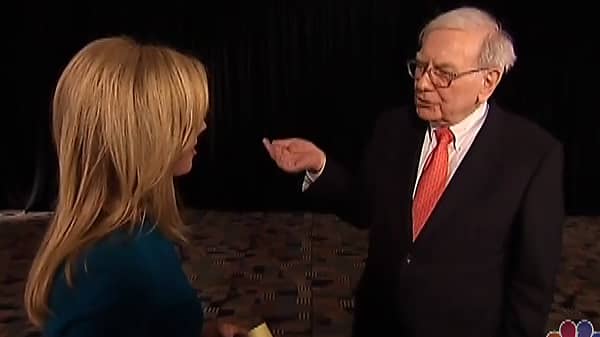BECKY QUICK: Warren, thank you for joining us today.
WARREN BUFFETT: My pleasure.
BECKY: You know, at one point you turned to Charlie Munger today and said, 'Who haven't we insulted yet?' (Buffett laughs) And I know you're not Charlie's keeper, but would you indulge me for just a minute? Let's go through some of the things he said today.
BUFFETT: Uh-oh.
BECKY: I'd like to get your take on them. First of all, on short sellers, he said, 'We don't like trading agony for money.'
BUFFETT: The reason he said that is because a stock, when you short it, can theoretically go to infinity. When you buy a stock at 10, you can only lose 10 points. When you short a stock at 10, it can go to 100 or 200. And occasionally you'll get into a situation on a short where you may know eventually it's going to turn out to be worth nothing, or very close to it, or it's a fraud, but what it can do in between can be very, very unpleasant. We like to sleep well, and you can't sleep well if you're short a lot of stocks.
BECKY: When he was asked about Greece, Charlie said, let's see, letting Greece into the EU was sort of like serving up rat poison for whipping cream.
BUFFETT: I don't think. (Laughs) I would not have chosen that. The — I think what he was getting at was that putting 17 countries into a monetary union where you synchronize the currency but you didn't synchronize any other aspects of their economies, I mean the fiscal policies, the culture, costs of production, was doomed to failure. And he could have used other illustrations of countries. (Laughs).
BECKY: All right, let's talk a little bit about bankers. He, on Friday, compared them to heroin addicts.
BUFFETT: Yeah, well, that's colorful Charlie, but I would say this, that leverage has enticed people to do crazy things for time immemorial. Bankers have an ability to attract money because they offer government-guaranteed deposits. You've got a government-guaranteed security. So, unless there are limits on them, there will be great temptations to over-leverage. They did some of that, and they can do it through other instruments, off balance sheet things or derivatives or that sort of thing, so you really need limitations on people. And he would say that, probably say that that heroin, basically, is leverage and the ability to just borrow more and more money through deposits or whatever, and that that should be controlled.
BECKY: Would you go to regulation as strictly as he has laid out some of his ideas?
BUFFETT: Well, we're in general agreement. There should be limitations on how much leverage you get in the system. And he and I are both suspicious of the degree to which derivatives can create a whole lot more leverage than people understand.
BECKY: He also said Friday that when it comes to high-frequency traders, he thinks it's basically legalized front running.
BUFFETT: That's what it is. Yeah, that's what it is. I mean, that's the whole game. Why a — let's say that high-frequency trading produces gross income of X. That X comes out of somebody. It doesn't make Berkshire Hathaway more productive. It doesn't do anything of the sort. It comes, one way or another, it comes out of the pocket of investors. And the social purpose of it is rather hard to discern. (Laughs)
BECKY: Another thing Charlie had to say when he was asked about the Fed and their policies when it comes to interest rates, he said, look, the Fed looked around and they hurt the savers because they were convenient.
BUFFETT: Yeah, well, it had to hurt somebody. Bernanke had tough choices to make, but he decided to step on the gas pedal, in terms of monetary policy, and he brought down rates to virtually unheard of levels, and kept them there. And he's still got his foot on the pedal and that really does hurt savers. I mean, it has made it extremely difficult for all kinds of people who live on fixed-income investments. But, unfortunately, that was a by-product. And probably Bernanke, maybe correctly, and I would say probably correctly, decided that the dangers to the economy were greater if he didn't do it.
BECKY: When it comes to Twitter, Charlie says he stays away from it like the plague. I know you have a Twitter account. You've only tweeted twice. Do you expect to tweet again anytime soon?
BUFFETT: It's not been at the top of my mind. I am — Charlie is the only guy less with it than I am. (Laughs)
BECKY: And you know, you had a really interesting comment today. You talked about the ten smartest words in economic history. Can you repeat those for us?
BUFFETT: Well, it was when George Bush came out in front of the White House (during the 2008 credit crisis) and said, 'If money doesn't loosen up, this sucker could go down.' And that summed it up. And incidentally, a number of members of his party disagreed with his actions during that time. George Bush was right on the money. He needed (Treasury Secretary) Paulson and he needed Bernanke and he needed them to put their foot to the floor in terms of loosening up things. And it worked, and he hadn't done it I think the consequences would have been terrible.
BECKY: When you were explaining why you've been buying newspapers, Charlie at one point said, basically you're saying it's an exception and you like doing it.
BUFFETT: He has a way of saying things, doesn't he? (Laughs) He's right. We're not doing anything dumb in the sense that we won't get a return on them, but in terms of moving the needle at Berkshire, it will never do it.
BECKY: Warren, thank you very much for you time.
BUFFETT: Thank you, Becky.




